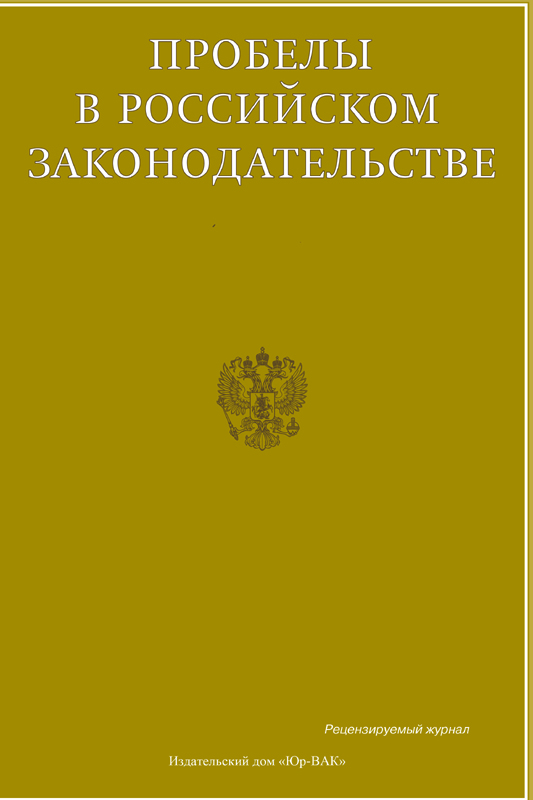Features of Legal Regulation of Labor and the Status of Foreign Laborin the Russian Federation
- Autores: Buyanova A.V.1
-
Afiliações:
- Financial University under the Government of the Russian Federation
- Edição: Volume 15, Nº 4 (2022)
- Páginas: 293-300
- Seção: Articles
- URL: https://journals.eco-vector.com/2072-3164/article/view/531737
- ID: 531737
Citar
Resumo
The article is devoted to highlighting the features of the legal regulation of the labor of foreign labor in Russia. The article analyzes the current Russian legislation on the procedure for attracting and using the labor of foreigners, including the latest, as well as issues of job quotas. The rights and obligations of foreign workers, guarantees of their work, as well as responsibility are disclosed. Special attention is paid to the analysis of the concepts of "migrant worker", "migrant worker", "foreign worker". The author formulates a conclusion about the need to unify these concepts found in international documents. In conclusion, the author substantiates the proposal to include a new chapter in the Labor Code of the Russian Federation regulating the procedure for attracting and using certain categories of foreign workers (including scientific and pedagogical workers).
Palavras-chave
Texto integral
Sobre autores
Anastasia Buyanova
Financial University under the Government of the Russian Federation
Email: avbuyanova@mail.ru
Cand.Sci.(Law), Associate Professor of the Department of Psychology and Human Capital Development Moscow, Russia
Bibliografia
- The Constitution of the Russian Federation (adopted by popular vote on 12/12/1993 with amendments approved during the nationwide vote on 07/01/2020) // SPS "ConsultantPlus"
- Federal Law "On the Legal Status of Foreign Citizens in the Russian Federation" of July 25, 2022 N 115-FZ // ATP "ConsultantPlus"
- Federal Law "On Citizenship of the Russian Federation" dated May 31, 2002 N 62-FZ // ATP "ConsultantPlus"
- Labor Code of the Russian Federation of December 30, 2001 N 197-FZ (as amended on February 25, 2022) (as amended and supplemented, effective from March 1, 2022) // ConsultantPlus SPS
- Civil Code of the Russian Federation (Civil Code of the Russian Federation) // ATP "ConsultantPlus"
- Recommendation No. 86 of the International Labor Organization “On Migrant Workers (Revised in 1949)” (together with the “Model Agreement on Temporary and Permanent Migration of Workers, Including the Migration of Refugees and Displaced Persons”) (adopted in Geneva on 01.07.1949 at 32 th session of the ILO General Conference) // ATP "ConsultantPlus"
- International Convention on the Protection of the Rights of All Migrant Workers and Members of Their Families (adopted by resolution 45/158 of the UN General Assembly of December 18, 1990) // ATP "ConsultantPlus"
- Convention N 143 of the International Labor Organization "On Abuses in the Field of Migration and on Ensuring Equality of Opportunity and Treatment for Migrant Workers" (concluded in Geneva on 24.06.1975) // ATP "ConsultantPlus"
- Decree of the Government of the Russian Federation of 07.10.2021 N 1706 "On the establishment for 2022 of the allowable share of foreign workers used by business entities engaged in certain types of economic activity on the territory of the Russian Federation" // SPS "ConsultantPlus"
- Order of the Ministry of Health and Social Development of the Russian Federation of July 28, 2010 N 564n (as amended on October 19, 2011) “On establishing cases of labor activity by a foreign citizen or stateless person temporarily staying (living) in the Russian Federation, outside the boundaries of the subject of the Russian Federation, on the territory of which they a work permit was issued (temporary residence was allowed) ”(registered with the Ministry of Justice of the Russian Federation on August 30, 2010 N 18283) // ConsultantPlus SPS
- On temporary measures to regulate the legal status of foreign citizens and stateless persons in the Russian Federation in connection with the threat of further spread of a new coronavirus infection (COVID-19) [Electronic resource]: Decree of the President of the Russian Federation of April 18, 2020 No. 274 // ATP " Consultant Plus"
- On Amendments to the Decree of the President of the Russian Federation of April 18, 2020 No. 274 "On temporary measures to regulate the legal status of foreign citizens and stateless persons in the Russian Federation in connection with the threat of further spread of a new coronavirus infection (COVID-19)" [Electronic law resource]: Decree of the President of the Russian Federation of September 23, 2020 No. 580 // SPS "ConsultantPlus"
- Andrianova M. A. Correlation of interaction of private international and labor law of Russia in the regulation of labor relations with the participation of foreigners // State and Law. 2002. №9.
- Private international law: Sat. norm. acts of the Ministry of Education and Science of the Russian Federation, Moscow State Law. Academy, comp.: G. K. Dmitrieva, M. V. Filimonova. M.: Prspekt, 2006. p. 195.
- Bazalei A. A., Kudryavtseva L. V. On the issue of conflicts in the legal regulation of the labor of foreign workers in the Russian Federation // Fundamental and applied sciences today: materials of the IX International Scientific and Practical Conference. 2016. P. 22.
- Koldina Yu. R. Features of termination of labor relations with foreign citizens [Text] / Yu. R. Koldina, E. V. Koroleva // Issues of Russian justice. - 2020. - No. 5. - pp. 382-399.
- Koldina Yu. R. Migration policy and the civil status of foreign citizens [Text] / Yu. R. Koldina // State, Society and Church: migration and intercommunication diversity. - 2018. - pp. 90-94.
- Nizamova E. A. On the concept of a foreign worker in the Russian Federation // Law in the modern world. 2017. No. 3. pp. 38-47.
- Khudyakova S. S. "Migrant worker", "Migrant worker", "Foreign worker": approaches to the definition of concepts in international and Russian law // Seventh Perm Congress of Legal Scholars. 2016. pp. 407- 412.
Arquivos suplementares









